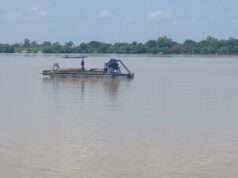The Center of Reflection for the Sahel (CR-Sahel), a think tank specialising in security, economic and development issues in the Sahel, which brings together various researchers and associations in the Sahel, has published an article on gold smuggling in Burkina Faso based on the testimony of a smuggler.
“The poor security situation in Burkina Faso provides favourable conditions for the prosperity of these traffickers. Indeed, alliances are developing between traffickers and armed terrorist groups who are in many ways the masters of the black market economy of gold,” writes CR-Sahel.
The article is based on the testimony of Doudou, a smuggler and member of one of many gold comptoirs operating in Burkina Faso and Mali, and describes one type of illegal gold transport circuit. He describes the arrangements that exist between traffickers and elements of the law enforcement agencies of the mentioned countries. This testimony also exposes the gaps in the road controls of travellers, particularly at the borders. For security reasons, we have changed the identity of our witness. Doudou is a member of an illegal gold panning operation in Burkina Faso. This comptoir has bases in the major urban centres, notably in the centre-north (Ouahigouya) and south-west (Gaoua) regions.

For CR-Sahel, gold is bought from artisanal gold miners who are then evaluated in Ouagadougou and transported to the Malian capital. He receives his orders directly from his boss, who tells him when and where to go, with how much raw gold. “I am always informed of the date of our trips and the itinerary on the day of the trip,” he says. That day, the destination was Bamako. “I boarded a local transport company in Ouagadougou the same night to go to Bobo Dioulasso [the second largest city in the west of the country]. I have 10 or 12 kilos of raw gold bars worth about 200 million CFA francs hidden in a backpack. I have to avoid attracting attention to myself and therefore I avoid conversations and exchanges with passengers, even when they are acquaintances. I also have to stay awake during the whole journey and for that I take drugs,” says Doudou. And “in general, the journey from Ouagadougou to Bobo Dioulasso goes without major difficulties at the checkpoints”, he continues.
The smuggler will be joined in Bobo-Dioulasso by another member of the organisation to go to “an office attached to the buying comptoir to make changes in the way the bars are handled”. Indeed, “from Bobo Dioulasso the bars are put in sports socks and then taped all along my body, more precisely from my stomach to my back”, adds Doudou.
Bobo-Dioulasso and Bamako are 546 kilometres apart. The journey, which is broken down into four specific routes, will be made entirely by motorbike, the most common means of transport in this West African region. The next destination is Orodara, a town 76 km from Bobo-Dioulasso. There, the trafficker passes “without danger” the “two checkpoints at the entrance and exit of the town” since these checkpoints concern “only identity documents and motorbike papers”. We are heading for Koloko, some 40km away. “After about an hour and a half’s drive, I take a bypass to get to Heremakono, on the Burkina-Mali border, where there is a “strict checkpoint”. But “I manage to get through the checkpoint on the watch of an agent of the Burkina Faso defence and security forces, with whom we have an arrangement. Our arrangement consists of paying a sum of between 600,000 CFA francs and one million CFA francs per quarter to help us cross the border without being detected,” says Doudou. It is “about 12 o’clock” when the courier enters Mali, and he has to “go fast to reach Bamako before nightfall”.
After two hours on the road and crossing the border, Doudou arrives in Sikasso. There he finds another Malian checkpoint. There “I read a second arrangement with a member of the defence and security forces, in exchange for 300,000 to 500,000 FCFA to avoid being checked and arrested. However, it happens that I come across agents with whom I have already dealt. In this case, the sum is reduced to 250,000 FCFA. After 14 hours that passed like a few minutes, Doudou took the road again and stopped again in Bougouni for a “light” control on his “origins” without “other forms of search”. The speech is well practised. He had to pay “systematically 25,000 CFA francs” after explaining that he was a Burkinabe trader going to Bamako “to buy goods and then resell them in Bobo-Dioulasso”. It was only at 8pm, a total of 12 hours’ drive, that Doudou arrived in Bamako. At the comptoir in Bamako, the merchandise is evaluated during the night “for the resale of the gold bars”. The next day, the ‘first half of the revenue’ is given to him. The other half “will arrive by another goods transport route from Bamako to Ouagadougou”.
“The return journey to Ouagadougou is also a moment of fear for me,” says Doudou, since at this stage of his journey he carries a large sum of money in a bag that is often difficult to hide. “I have to be more careful because a simple search of my bag at the border controls can lead to my arrest”. “Furthermore, I can be the victim of an armed robbery on my return, as this happens very often to some of our employees at other comptoirs. Personally I have never been a victim of this but I have to remain vigilant all the way home”.
Once he arrived in the city of Bobo-Dioulasso, Doudou went to his sub-comptoir in that city. Thus, on the instructions of his boss in Ouagadougou, the money carried is divided equally. Half stays at the comptoir in Bobo-Dioulasso, the other half is transported by Doudou to Ouagadougou. “As soon as I arrived in Ouagadougou, I was welcomed at the station by an employee and the management at our comptoir, but I had to make detours around the city to make sure that we were not followed by the agents of the National Anti-Fraud Brigade (BNAF) in Ouagadougou.
Summary by Elie KABORE
#Mines_Actu_Burkina









